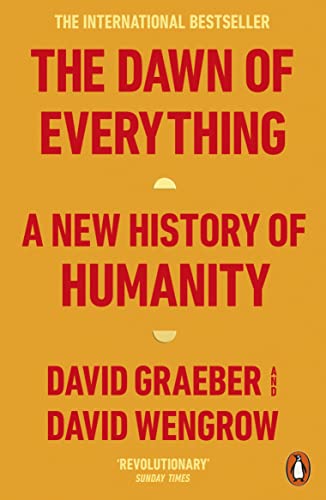Artículos relacionados a The Dawn of Everything: A New History of Humanity

- EditorialPenguin
- Año de publicación2022
- ISBN 10 0141991062
- ISBN 13 9780141991061
- EncuadernaciónTapa blanda
- Número de edición1
- Número de páginas720
- Valoración
Comprar nuevo
Ver este artículo
Gastos de envío:
EUR 2,43
A Estados Unidos de America
Los mejores resultados en AbeBooks
The Dawn Of Everything
Cantidad disponible: 3 disponibles
Librería: GreatBookPrices, Columbia, MD, Estados Unidos de America
Condición: New. Nº de ref. del artículo: 44040422-n
The Dawn of Everything (Paperback)
Cantidad disponible: 1 disponibles
Librería: Grand Eagle Retail, Wilmington, DE, Estados Unidos de America
Paperback. Condición: new. Paperback. A breathtakingly ambitious retelling of the earliest human societies offers a new understanding of world historyFor generations, our remote ancestors have been cast as primitive and childlike - either free and equal, or thuggish and warlike. Civilization, we are told, could be achieved only by sacrificing those original freedoms or, alternatively, by taming our baser instincts. David Graeber and David Wengrow show how such theories first emerged, and why they are wrong. In doing so, they overturn our view of human history, including the origins of farming, cities, democracy, slavery and civilization itself.Drawing on path-breaking research in archaeology and anthropology, the authors show how history becomes a far more interesting place once we begin to see what's really there. If humans did not spend 95 per cent of their past in tiny bands of hunter-gatherers, what were they doing all that time? If agriculture and cities did not mean a plunge into hierarchy, then what kinds of organization did they lead to? The answers are often unexpected, and suggest that the course of history may be less set in stone, and more full of playful possibilities than we tend to assume.The Dawn of Everything fundamentally transforms our understanding of the human past and offers a path toward imagining new forms of freedom. This is a monumental book of formidable intellectual range, animated by curiosity, moral vision and faith in the power of direct action. Shipping may be from multiple locations in the US or from the UK, depending on stock availability. Nº de ref. del artículo: 9780141991061
The Dawn of Everything: A New History of Humanity
Cantidad disponible: 3 disponibles
Librería: Kennys Bookshop and Art Galleries Ltd., Galway, GY, Irlanda
Condición: New. 2022. paperback. . . . . . Nº de ref. del artículo: 9780141991061
The Dawn of Everything: A New History of Humanity
Cantidad disponible: 3 disponibles
Librería: Kennys Bookstore, Olney, MD, Estados Unidos de America
Condición: New. 2022. paperback. . . . . . Books ship from the US and Ireland. Nº de ref. del artículo: 9780141991061
The Dawn of Everything: A New History of Humanity
Cantidad disponible: Más de 20 disponibles
Librería: Monster Bookshop, Fleckney, Reino Unido
Paperback. Condición: New. BRAND NEW ** SUPER FAST SHIPPING FROM UK WAREHOUSE ** 30 DAY MONEY BACK GUARANTEE. Nº de ref. del artículo: 9780141991061-GDR
The Dawn of Everything
Cantidad disponible: 11 disponibles
Librería: Ria Christie Collections, Uxbridge, Reino Unido
Condición: New. PRINT ON DEMAND Book; New; Fast Shipping from the UK. No. book. Nº de ref. del artículo: ria9780141991061_lsuk
The Dawn of Everything (Paperback)
Cantidad disponible: 2 disponibles
Librería: AbProulx, Gatineau, QC, Canada
Condición: New. Nº de ref. del artículo: 723
The Dawn of Everything
Cantidad disponible: Más de 20 disponibles
Librería: Ria Christie Collections, Uxbridge, Reino Unido
Condición: New. In. Nº de ref. del artículo: ria9780141991061_new
The Dawn of Everything: A New History of Humanity
Cantidad disponible: 1 disponibles
Librería: Revaluation Books, Exeter, Reino Unido
Paperback. Condición: Brand New. 1st edition. 720 pages. 7.72x5.16x1.57 inches. In Stock. Nº de ref. del artículo: __0141991062
The Dawn of Everything: A New History of Humanity
Cantidad disponible: Más de 20 disponibles
Librería: THE SAINT BOOKSTORE, Southport, Reino Unido
Paperback / softback. Condición: New. New copy - Usually dispatched within 4 working days. Nº de ref. del artículo: B9780141991061

